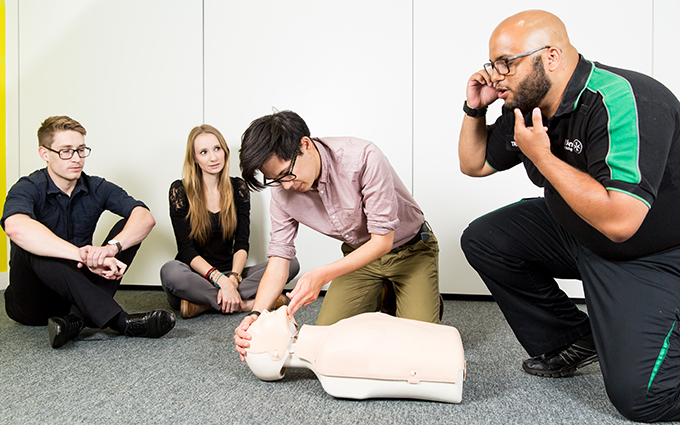Published: 05th Febuary 2025.
Last updated: 05th Febuary 2025.
Author: Lisa Sharman, National Head of Education & Commercial Training at St John Ambulance.
Contents

In the modern workplace, first aid is about much more than ticking a compliance checkbox. It’s a strategic investment that demonstrates an organisation’s commitment to the health, safety and wellbeing of its employees.
First aid programmes that go beyond meeting legal requirements help create safer work environments, enhance morale and even improve productivity.
A comprehensive physical and mental health first aid strategy has the potential to transform your organisation, demonstrating a genuine commitment to welfare. Done well, it signals a proactive approach and can turn first aid from an emergency response system into an integral part of a thriving, supportive and health-conscious culture.
More than just a checkbox
Workplace first aid regulations are not just a legal formality, but a crucial part of employee safety that requires serious attention. The UK Health and Safety Executive (HSE) mandates that employers provide adequate and appropriate first aid equipment, facilities and personnel to ensure immediate attention for employees who are injured or become ill at work. This applies to all workplaces, including those with fewer than five employees.
Employers must conduct a thorough needs assessment – considering workplace hazards, workforce size and distribution – to tailor first aid requirements effectively. St John Ambulance provides a range of tools to help organisations meet the regulations and simplify their planning, including online calculators that help determine the recommended number of first aiders and first aid kits.
Attracting top talent
There’s now more of an expectation than ever for employers to provide a supportive environment that values wellbeing. Expectations around employee health are shifting across the board, with a growing emphasis on mental health. Almost all (96%) employees surveyed by corporate wellness platform Gympass actively seek employers that prioritise wellbeing, and 88% of UK employees now consider wellbeing to be as important a factor as salary.
This shift intersects with reputation, since companies that prioritise safety and mental health are viewed more favourably by both current and potential employees. A strong health and wellbeing culture, including mental health support, underscores trust, enhances engagement and retention, and creates a more inclusive and positive workplace.
In today’s competitive job market, a business that’s seen as caring, supportive and committed to employee wellness can attract top talent.
Offering comprehensive first aid training
Training equips individuals with the skills and confidence to save lives in critical situations, both at work and in their personal lives.
St John Ambulance first aid trainers frequently hear stories from course attendees about how their training has saved lives. For example, headteacher and designated first aider Jude knew how to keep a colleague safe during a seizure and loss of consciousness at school, while mental health first aider Phil was able to support a suicidal colleague, crediting the course for teaching him how to truly listen.
The lifesaving skills gained from such training extend far beyond the workplace, bringing vital benefits to families and communities. By integrating both physical and mental health first aid, and cultivating a culture of care and preparedness, we can create safer, more resilient environments.
Choosing the right first aid training
Developing confident and capable responders can make a real difference in emergencies. The best training programmes far exceed the minimum compliance standards, imparting essential skills and fostering a deep understanding of emergency response.
Accredited, up-to-date training programmes are vital, as they ensure participants receive the most current, evidence-based techniques and knowledge. And while, in the UK, first aid certificates typically last for three years, the HSE recommends first aiders complete annual refreshers. High-quality training, such as that offered by accredited organisations like St John Ambulance, creates confident, capable responders who can act when required.
4 practical steps to implementing effective first aid training
- Conduct a comprehensive workplace risk assessment
Every workplace is unique, and conducting a thorough risk assessment is crucial to identify potential hazards and determine the specific first aid requirements. This assessment should be revisited regularly, ideally annually, to ensure it accounts for any changes, new hazards, or emerging risks. It will also guide you in determining the appropriate level of first aid training and the necessary equipment. - Create a training and refresher course schedule
Make sure employees receive regular, up-to-date training in both physical and mental health first aid, with annual refreshers. This will help maintain their skills and confidence when responding to emergencies. - Make sure you have appropriate equipment available
First aid kits, defibrillators and other critical medical supplies should be readily available, easily accessible and kept up to date. And it’s not just enough to install it, someone needs to take responsibility for checking the equipment regularly to guarantee it is fully stocked and in working condition. - Integrate first aid training into broader employee wellness initiatives
First aid should be part of a broader strategy that includes mental health support and other initiatives like mental health literacy for all employees and stress management. Creating a culture of care and preparedness means these efforts touch most aspects of your organisation’s operations.
First aid for the future
Workplace first aid is no longer just about meeting minimum legal requirements, it creates safer, more supportive workplaces and is a strategic investment in your employees’ health, safety and wellbeing.
By training colleagues to prevent, recognise and respond to a range of physical and mental health challenges, organisations foster a culture of care that enhances satisfaction and productivity.
The benefits of investing in first aid training extend far beyond compliance – they show that your organisation genuinely values the health of its people, creating a resilient, capable and engaged workforce.
Click here to learn more about the courses on offer at St John Ambulance.











